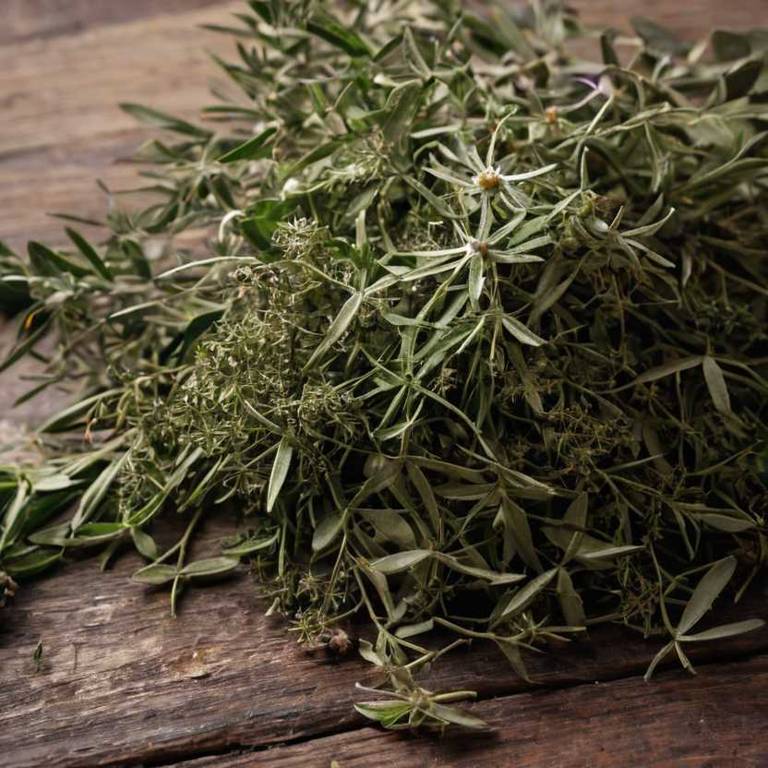By Leen Randell
Updated: Jul 22, 2024
10 Precautions To Take When Using Olea Europaea (Olive)

Olea europaea has some precautions to consider before using it medicinally, such as potential interactions with blood thinners and diabetes medications.
It's essential to take these precautions to avoid adverse effects like bleeding, bruising, or hypoglycemia. For instance, not monitoring blood sugar levels while taking olive may lead to severe hypoglycemia.
Furthermore, not disclosing olive use to healthcare providers may result in unintended interactions with other medications.
This article explains in details the 10 most important precautions to take when using Olea europaea medicinally.
- 1. Inform healthcare provider fully
- 2. Inform healthcare provider fully
- 3. Inform healthcare provider fully
- 4. Inform healthcare provider fully
- 5. Inform healthcare provider fully
- 6. Inform healthcare provider fully
- 7. Inform healthcare provider fully
- 8. Inform healthcare provider fully
- 9. Inform healthcare provider fully
- 10. Inform healthcare provider fully
1. Inform healthcare provider fully
When using Olea europaea medicinally, it's important to take under medical supervision because of its potential interactions with medications and the risk of adverse reactions.
Oleuropein, a key compound in olive, may lower blood pressure too much, causing dizziness or lightheadedness when combined with blood pressure-lowering medications. Additionally, olive oil may slow down the absorption of certain medications, leading to reduced efficacy.
A healthcare professional can help ensure safe and effective use of olive extracts.
2. Inform healthcare provider fully
When using Olea europaea medicinally, it's important to consume in recommended doses.
This precaution is crucial because excessive consumption can lead to adverse effects on the liver and kidneys. Additionally, high doses may interact with certain medications, such as blood thinners, and increase the risk of bleeding or other complications.
By following recommended dosages, individuals can reap the benefits of olive's medicinal properties while minimizing potential risks.
3. Inform healthcare provider fully
When using Olea europaea medicinally, it's important to avoid in pregnancy or breastfeeding.
This is because the herb may stimulate the uterus and cause contractions, which can lead to miscarriage or premature labor. Additionally, oleuropein, a compound found in olive, has been shown to affect breastmilk production, potentially reducing milk supply and compromising infant nutrition.
Taking these precautions ensures the safe use of Olea europaea for medicinal purposes.
4. Inform healthcare provider fully
When using Olea europaea medicinally, it's important to stop if skin reactions occur.
This precaution is crucial because Olive oil can cause skin irritation, including redness, itching, and even blistering in some individuals.
If you experience any adverse skin reactions, it is essential to discontinue use immediately to prevent further complications or exacerbation of the condition.
5. Inform healthcare provider fully
When using Olea europaea medicinally, it's important to report allergic reactions immediately.
This precaution is crucial because olive oil and its derived products can cause anaphylaxis, a severe allergic reaction that requires immediate medical attention. Additionally, some people may be sensitive to the chemical compounds present in olives, such as oleuropein or hydroxytyrosol, which can trigger asthma attacks, skin rashes, or gastrointestinal issues.
By reporting any adverse reactions promptly, individuals can prevent serious complications and ensure a safe and effective treatment experience.
6. Inform healthcare provider fully
When using Olea europaea medicinally, it's important to monitor blood pressure closely due to its potential impact on hypertension.
The flavonoids and phenolic compounds present in olive oil may interact with certain medications, such as blood thinners, and cause a sudden drop in blood pressure, leading to dizziness or fainting. Additionally, excessive consumption of olive oil can lead to increased sodium intake, exacerbating high blood pressure conditions.
Close monitoring enables healthcare professionals to adjust treatment plans accordingly and ensure patient safety.
7. Inform healthcare provider fully
When using Olea europaea medicinally, it's important to avoid taking it with hypertension medications.
This precaution is crucial because Olea europaea has been shown to have a hypotensive effect, which can further lower blood pressure and potentially lead to adverse interactions with antihypertensive drugs. Combining the two may exacerbate the risk of hypotension, increasing the likelihood of dizziness, lightheadedness, or even fainting.
It's essential to consult with a healthcare professional before using Olea europaea medicinally to ensure safe and effective treatment.
8. Inform healthcare provider fully
When using Olea europaea medicinally, it's important to do not use orally because of its potential toxic effects on the digestive system.
The unripe or ripe fruits, leaves, and pits of Olea europaea contain oleuropein, a bitter compound that can cause gastrointestinal irritation, nausea, vomiting, and diarrhea if ingested. Additionally, oral administration may lead to interactions with prescription medications, exacerbating their adverse effects.
Therefore, it's crucial to follow the recommended application methods for topical use only, ensuring safe and effective treatment without compromising overall health.
9. Inform healthcare provider fully
When using Olea europaea medicinally, it's important to start with low concentrations.
This is crucial because oleuropein, a compound found in the plant, can exhibit nephrotoxic and hemolytic properties at high doses. Starting with low concentrations allows for gradual titration and monitoring of individual tolerance, reducing the risk of adverse reactions.
Additionally, using small initial amounts enables researchers to accurately assess the efficacy and safety of the extract before scaling up or administering it to patients.
10. Inform healthcare provider fully
When using Olea europaea medicinally, it's important to be aware of interactions.
As an herbal remedy, olive oil can interact with certain medications, such as blood thinners and diabetes drugs, which may lead to adverse effects or reduced efficacy. Additionally, individuals with allergies to certain plants in the Lamiaceae family (such as lavender or rosemary) may also experience allergic reactions when using olive oil.
Therefore, it's crucial to consult with a healthcare professional before incorporating olive oil into your medication regimen to avoid potential interactions and ensure safe use.